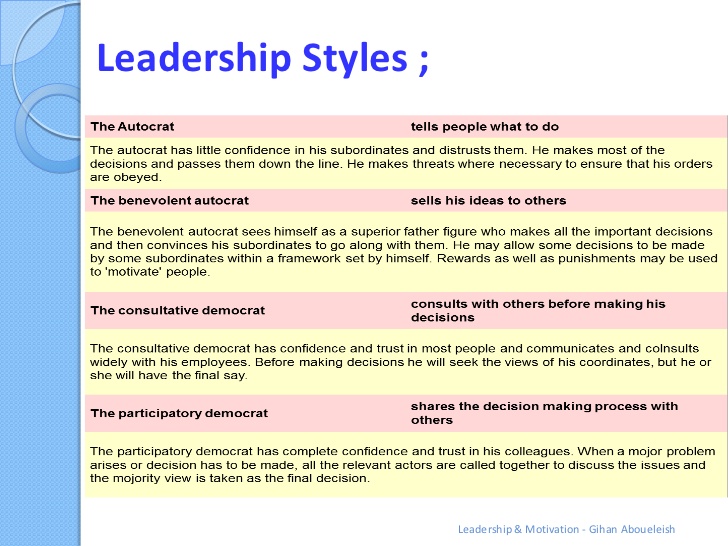Leadership Outline Examples
What does it take to be a leader in the first place? We have heard that overused word ever since elementary and high school days wherein one member of the group has to take charge so that the group will be able to perform well. But the concept itself has failed for many reasons. For instance, some leaders tend to assign group members the role of what they are requested to do, but ultimately, the leader takes all the credit. This paints a picture that the leader is too lazy to even contribute to the success of the group.
There are some members who are given the position of a leader, but does not know anything about being one. And so, the burden of the position falls on another member. Some are complicated while some are easygoing leaders. And that is the reality of it all, even at work. You will be meeting different kinds of leaders, with different attitudes towards members, and a different disposition on how he or she sees the world. But in the end, they are still someone with authoritative figure that you have to respect.
True leaders know that there is always room for improvement, not only within themselves, but also for their members. Merriam-Webster defines a leader with two meanings: either as the person (as an employer or supervisor) who tells people and especially workers what to do or someone that takes the lead or sets an example. The first definition of a leader sounds more like a boss or a commanding officer than someone who is willing to become a role model to the others. There are only two kinds of leaders in this world: ones who know how to lead and the ones who do not. You may also look at leadership speech examples.
Why is Team Leadership Important?
Friedrich Schiller says that a strong man is strongest alone. Well, that may be true in some cases, there will be days when you need to ask for help from others and when it comes, you must be ready to accept all the help you can get with open arms. Here are some of the reasons as to why being a team leader is very important:
• Teamwork is the root of all success and integrity in a business
• Each and every one of us works in a team- whether it is professionally and personally
• Teamwork and collaboration will become more important and critical than ever for group projects and team assignments
• Physician’s training traditionally focuses on being autonomous, making decisions, and being independent
• Excellent leadership skills eventually lead to high performing teams that improve patient safety and health outcomes
Role of the Team Leader
There are many roles that a leader is burdened with. But it can be boiled down to only three descriptions:
• Just like the conductor of an orchestra, you are leading the team and the team has to proceed with your direction
• The orchestra may consist of many instruments: the violins, the cellos, the pianos, the saxophone, etc… but the goal to be reached is the same- to play the piece assigned to them with percision
• And finally, the conductor must be able to understand the roles of the different instruments as well as to have vision and knowledge to read music and help others work together to produce harmonious and glorious music.
Characteristics of a Good Leader
What are some of the characteristics that encompasses a good leader? What are the qualities that he or she must possess in order to become a great one?
– Being flexible, but firm at the same time
– Visualizing a clear objective in mind
– Honesty with a sense of integrity
– Never giving up and enduring to the end
– Having an authoritative voice that encourages respect and camaraderie in the team
– Knowledgeable and sensible as well
– Always double checking with the progress of other members
There are many more characteristics that are not mentioned here. But the question is: how will you incorporate these traits into your own style of leadership?
Attributes of Successful Team Leaders
What are some attributes that team leaders have? Team leaders:
• do their bet to inspire others
• motivate others and oneself to do better
• communicate to others with a positive vibe and with confidence
• turns hindrances and obstacles to opportunities
• get the team engaged
• take the time to share the message with others
Successful Leaders Inspire
• They do not only tell stories based on their personal experiences, but they also learn to lead by example.
Successful Leaders Motivate
• Communicate and articulate with the rest of the team. Members would obviously want to know whether their efforts are being maximized to the fullest. Ask yourselves the purpose of what you are doing, why you are doing it, and how does it fit in with the larger mission?
• Listen to responses. A good leader always listens. He or she does not act like a boss who dictates tht his word is law and no one can argue otherwise. He or she must be willing to listen to what the others have to say as well.
• Discuss problems and encourage new ideas. As mentioned before, the leader must be open to communication and feedback from the team. If the members find other problems and create new ideas that the leaders could not, then by all means, let them speak.
• Give recognition through reward or feedback. Give what is due. If you think one member of the group has performed his job remarkably well, then give him the credit he or she deserves so that the person’s efforts might be appreciated.
• Be available. Always lend your help and your hand every time they need help.
Successful Leaders Communicate Effectively
Assumption is the mother of all things gone wrong. So as a leader, make sure you disseminate your information thoroughly and completely to avoid confusion among the rest of the members. As a member, always clarify the instructions with your leader in case there is an instruction that you do not really understand.
Successful Leaders Listen
As repeatedly mentioned, communication is key and is critical. So make sure that when a member would like to voice out his or her opinion to you and the rest of the group, listen. Because in listening to others with your undivided attention, you are not only giving them the respect they deserve but you also value their feedback and insight on the status of the project. Try not to be selfish with your time in giving them the attention they need.
Successful Leaders Understand Personality Styles
In one episode of the anime Log Horizon, Minori needed to step up her role as the shy girl in order to defeat the monsters by getting to know her teammates one by one: their personalities, their attack specialties, their weaknesses. Basically she needed to learn everything about them so that they can create a battle plan to secure the victory.
Successful Leaders Have Integrity
• Be honest. Do not only share your successes, but also share on the times you were challenged as a leader.
• Be fair. One for all, and all for one. If the team succeeds, then it is a team effort. If the team has failed, then that means the team will improve to do better.
• Follow through. Do not over-exaggerate your promises. Deliver what you can.
Leadership Styles Example

Source
Being a leader is not easy, but it can be fulfilling and can develop your ability to communicate and take a commanding position when the need arises. We hope you found our leadership outline examples to be informative as you do not only lead to give orders, but to lead to become an inspiration and motivational force to your subordinates.


